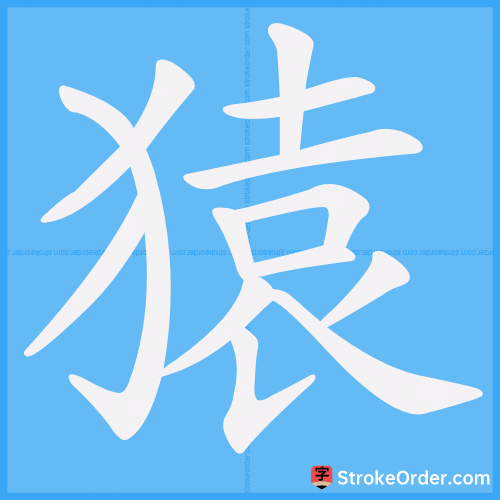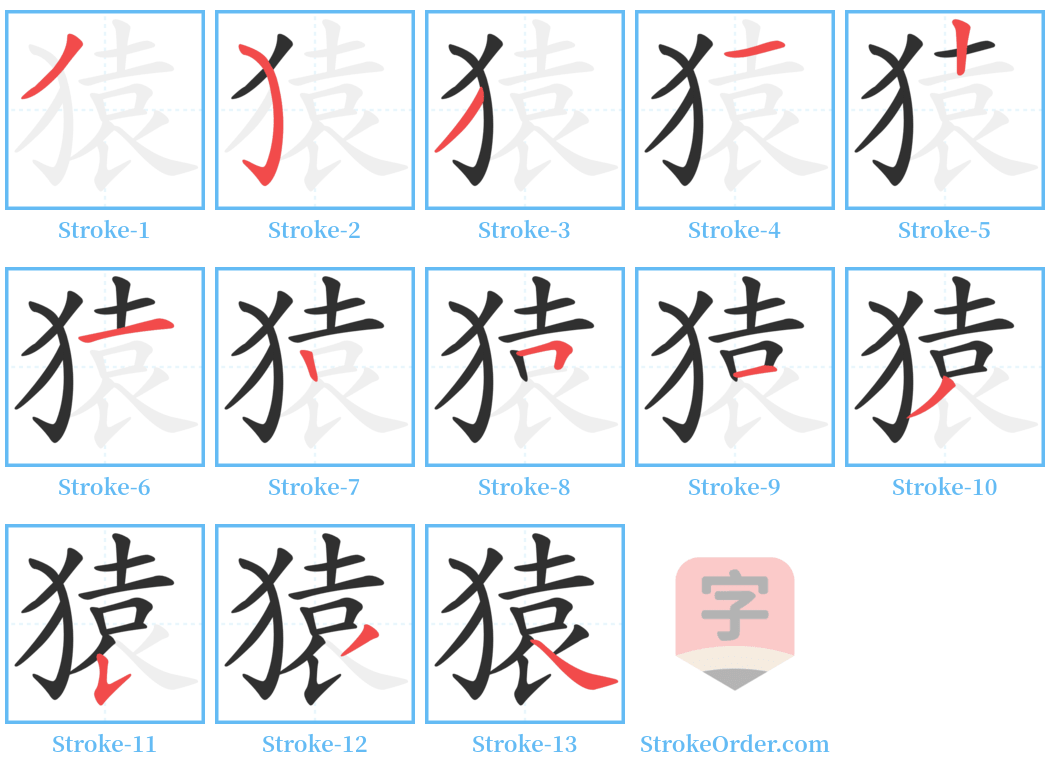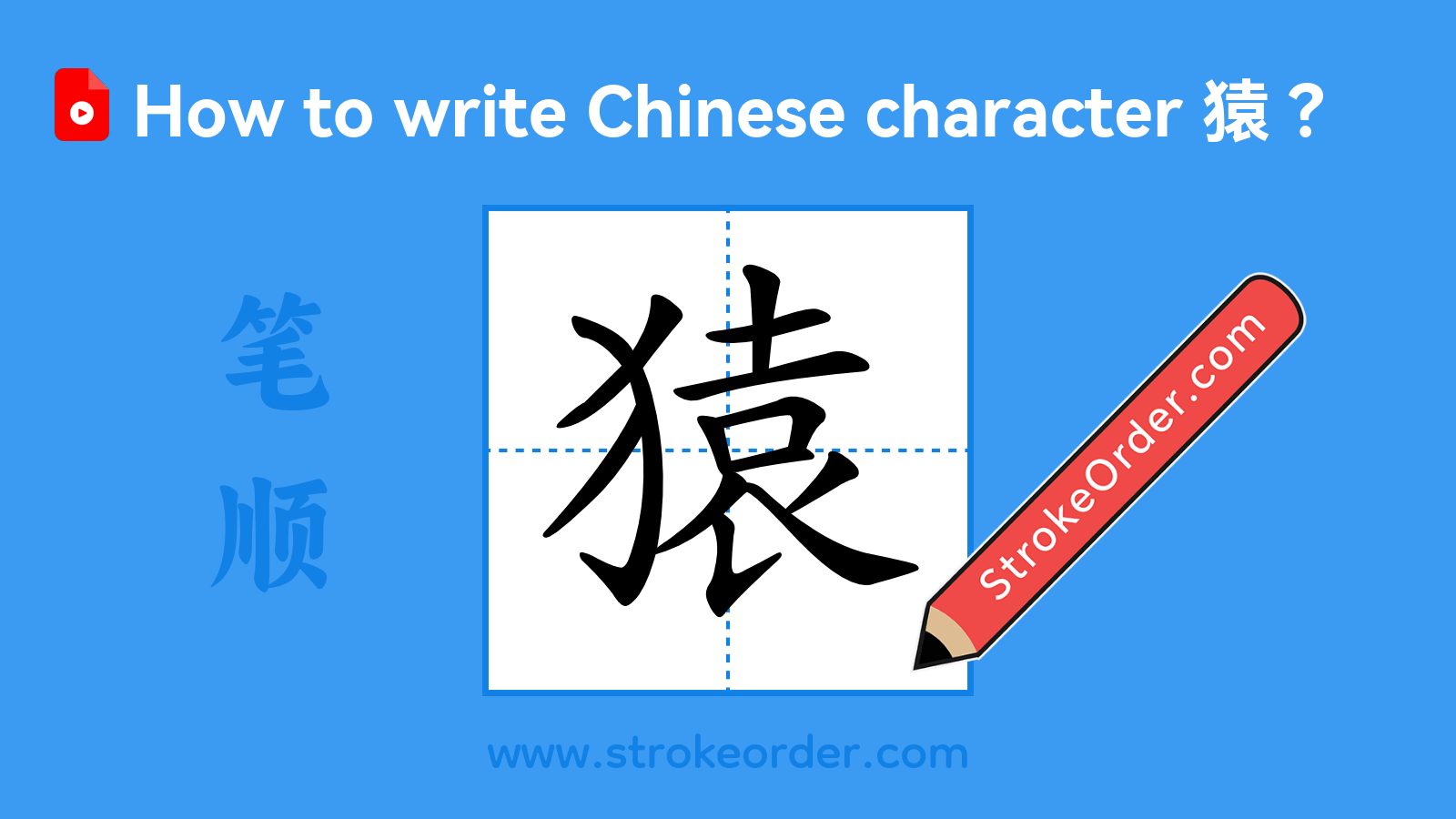猿 Stroke Order
Animated Stroke Order of 猿

Stroke Order Diagrams for 猿

Step-by-Step Handwriting Guide for 猿

Learn to Write Chinese Characters with Video Tutorials
Watch the video of writing the Chinese character "猿", learn the correct stroke order (笔顺) of the character "猿", and master the standard way of writing the character "猿".

Free Printable Handwriting Practice with Stroke Order: 猿
Printable Writing Practice Worksheet of "猿" in Portrait Orientation (Tian Zi Ge)

Printable Writing Practice Worksheet of "猿" in Landscape Orientation (Tian Zi Ge)

Information of 猿
Pinyinyuán
Radical
犭
Strokes
13 strokes
Usage
★★★★★
Definition
ape
猿 (yuán)1. A type of mammal that resembles monkeys but is larger, has no cheek pouch, and lacks a tail. Examples include orangutans, gorillas, and gibbons.猿猴。猿人。2. (Noun) The primary meaning: a primate that resembles monkeys in appearance.【本义】: 灵长类动物,形态与猴相似3. (Character creation method): A phonetic character combining the radical for dog (犬) and the sound of "yuan" (袁). The term includes "犬" because of the resemblance of apes to dogs.【造字法】: 形声。从犬,袁声。猿似犬,故从犬。引 (References):1. From the "Shuowen Jiezi": "蝯善援,禺属." Commonly written as "猨、猿".2. From "Kaogongji": "The raccoon dies if it crosses the Wen River. Note: 'the raccoon may refer to 猨, meaning the one that is good at climbing trees.'"3. From "Shijing": "Do not instruct the climbing monkeys to ascend the trees. Comment: '猱, belongs to the 猨 category.'"4. From "Zhuangzi": "The ape descends from the mountains and forests."5. From "Han Dynasty, Dong Zhongshu's 'Chunqiu Fanlu'": "The reason for the longevity of apes is because they enjoy pulling at their tails, thus their energy surpasses others."Examples:猿猴献果 (refers to the posture of binding one’s limbs together in front); 猿狖 (ape); 猿眩 (ape looking down from a cliff); 猿臂 (arms as long as an ape, easily maneuvered, also used metaphorically for a favorable situation in combat).
apes and monkeys
lit. heart like a frisky monkey, mind like a cantering horse (idiom); fig. capricious (derog.) / to have ants in one's pants / hyperactive / adventurous and uncontrollable
gibbon / Hylobatidae (gibbon and lesser ape family)
Peking ape-man / Homo erectus pekinensis (c. 600,000 BC), discovered in Zhoukoudian 周口店[Zhou1 kou3 dian4] in 1921
apeman
Lantian apes
hominid
Ramapithecus
orangutan
in a restless and jumpy mood / restless and whimsical
Input Method for 猿
Pinyinyuan2
Wubi
qtfe
Cangjie
khgrv
Zhengma
qmjr
Four Corner
44232
Unicode
U+733f
Same Pronunciation Characters
元冤原员园圆怨愿援渊源猿缘苑袁远院鸳圜垣垸塬媛掾橼沅爰瑗箢螈辕鸢鼋員園圓夗櫞淵眢緣肙蚖蜎轅遠願鳶鴛黿悁囦剈弲渁渆渕寃葾惌蒬棩鹓蜵駌鋺鵷嬽灁鼘鼝邧贠杬笎酛厡圎傆鈨猨湲蒝獂溒媴嫄榬榞褑蝯蝝魭褤縁薗羱謜鎱
Same Radical Characters
犯犹狂狈狐狗狞狠狡独狭狮狰狱狸狼猎猖猛猜猩猪猫猬猴猾猿犰犷犸狁狄狍狎狒狙狨狩狯狲狳狷狺猁猃猕猗猝猞猡猢猥猱猹獐獗獠獬獭獾犭犴犾狃狉狴狹狻狽猇猊猓猙猲猳猵猶猸猻獄獅獍獨獯獲獵獷玃獓獙獱犻狛猼獊犲獑猭獕
本文来自人间香奈儿投稿,不代表汉字笔顺中文网英文版立场,如若转载,请注明出处:https://www.strokeorder.cn/strokeorder/6492.html

 微信扫一扫
微信扫一扫 